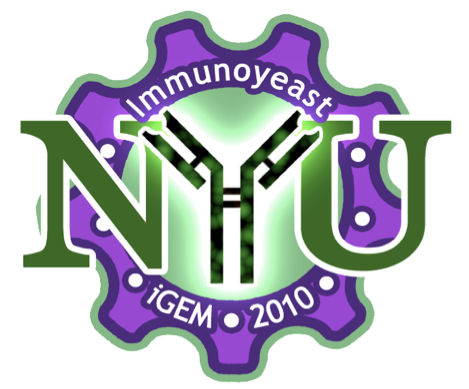From 2010.igem.org
(Difference between revisions)
|
|
| Line 2: |
Line 2: |
| | | | |
| | [[Image:NYU_logo.png|border|250px|right|]] | | [[Image:NYU_logo.png|border|250px|right|]] |
| - |
| |
| - |
| |
| - | '' Our game plan for the international genetically engineered machine competition is to construct a yeast strain capable of independent antibody discovery. Instead of relying on antibody display that require high-throughput fluorescent screening, currently the dominant method for microbial antibody discovery, our strain will be able to select for high antibody binding without outside influence. We will accomplish this by linking the antibody library and antigen with the split ubiquitin system, which will allow the yeast cells to sense the amount of antibody::antigen complexing.
| |
| - | ''
| |
| - |
| |
| - |
| |
| - | Basically, the single chain variable fragment (scFv) antibody will be fused to the N-terminal domain of ubiquitin (N-ub) and the target antigen will be fused to the C-terminal domain (C-ub). When the antibody and antigen form a complex, the two domains of ubiquitin are brought together and any protein that is fused downstream of C-ub will be cleaved from the rest of the complex by a ubiquitin protease. To use this mechanism to our advantage, we will fuse the Gal4 activator protein downstream of antigen::C-ub complex. So, when the antibody binds the antigen, Gal4p will be released, translocated into the nucleus and will affect transcription of genes that confer greater cell survival in the environment (either amino acid biosynthesis or, for a control, antibiotic resistance).
| |
| - |
| |
| | | | |
| | <!--- The Mission, Experiments ---> | | <!--- The Mission, Experiments ---> |
Revision as of 23:17, 29 July 2010
It's NYU's first year at the iGEM competition and we are all synbio newbies, but we are very confident in our project this year! Unlike most other iGEM teams, we are made up of 5 undergraduate students and only two faculty advisers.
 "
"
